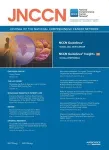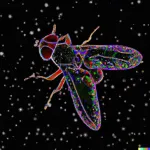New research in JNCCN suggests a simple and inexpensive option for reducing a major chemotherapy side-effect
Study led by University of Michigan Rogel Cancer Center finds vitamin D supplements may help reduce chemotherapy-induced neuropathy, with possible implications for also reducing racial disparities
2023-11-07
(Press-News.org) PLYMOUTH MEETING, PA [November 7, 2023] — New research in the November 2023 issue of JNCCN—Journal of the National Comprehensive Cancer Network suggests that patients who have insufficient levels of vitamin D before starting paclitaxel treatment are more likely to experience peripheral neuropathy. According to an analysis of 1,191 patients with early-stage breast cancer—using data collected in the SWOG S0221 study—20.7% of patients with vitamin D deficiency experienced at least a grade 3 level of chemotherapy-induced peripheral neuropathy (CIPN), compared to 14.2% of those with sufficient vitamin D levels. The researchers also found that inducing vitamin D deficiency in an accompanying mice model study caused neurotoxicity-like symptoms.
“These results suggest that vitamin D supplementation in patients with lower levels of vitamin D may reduce peripheral neuropathy, and particularly high grade peripheral neuropathy, which would improve these patients’ long-term quality of life,” explained senior researcher Daniel L. Hertz, PharmD, PhD, University of Michigan College of Pharmacy. “There are barely any negative consequences that come from taking steps to increase vitamin D levels. Patients can easily take safe, inexpensive, and widely available over-the-counter supplements.”
Dr. Hertz explained that CIPN is a common side effect of paclitaxel and several other commonly used anticancer drugs. It typically appears as numbness, tingling, and sometimes burning pain in the fingers and toes. CIPN can eventually lead to the loss of sensation in hands and feet. These symptoms are largely untreatable and can sometimes be permanent, so it is critical that patients and oncology health care providers monitor for CIPN during treatment to address the development of treatment-related peripheral neuropathy before symptoms become intolerable.
The researchers also noted that it is well-established that vitamin D deficiency is more common in self-reported Black patients. This population group is also at higher risk of CIPN. There are additional studies underway to learn more about the role vitamin D supplements may be able to play in improving outcomes for these patients.
“This prospective-retrospective analysis of the SWOG S0221 study has revealed a significant association between vitamin D insufficiency and an increased incidence of chemotherapy induced peripheral neuropathy,” commented Mei Wei, MD, Huntsman Cancer Institute at the University of Utah, who was not involved in this research. “This study finding uncovers a new potential strategy to combat CIPN, thereby improving the quality of life for cancer patients undergoing treatment. It is an exciting step forward in our continuous mission of patient-centered cancer care.”
Dr. Wei, who is a Member of the NCCN Clinical Practice Guidelines in Oncology (NCCN Guidelines®) Panel for Breast Cancer, added: “We eagerly await the results of the ongoing study ‘Genetic and Inflammatory Biomarkers in Neuropathic Pain Secondary to Chemotherapy (Genie-B)’, led by Dr. Daniel Rotroff, Dr. Joseph Foss, and Dr. Kenward Johnson at Cleveland Clinic. This research holds the promise of shedding future light on the mechanisms underlying CIPN and the potential identification of biomarkers that could predict CIPN incidence.”
To read the entire study, visit JNCCN.org. Complimentary access to “Vitamin D Insufficiency as a Risk Factor for Paclitaxel-Induced Peripheral Neuropathy in SWOG S0221” is available until February 10, 2024.
# # #
About JNCCN—Journal of the National Comprehensive Cancer Network
More than 25,000 oncologists and other cancer care professionals across the United States read JNCCN—Journal of the National Comprehensive Cancer Network. This peer-reviewed, indexed medical journal provides the latest information about innovation in translational medicine, and scientific studies related to oncology health services research, including quality care and value, bioethics, comparative and cost effectiveness, public policy, and interventional research on supportive care and survivorship. JNCCN features updates on the NCCN Clinical Practice Guidelines in Oncology (NCCN Guidelines®), review articles elaborating on guidelines recommendations, health services research, and case reports highlighting molecular insights in patient care. JNCCN is published by Harborside/BroadcastMed. Visit JNCCN.org. To inquire if you are eligible for a FREE subscription to JNCCN, visit NCCN.org/jnccn/subscribe. Follow JNCCN on Twitter @JNCCN.
About the National Comprehensive Cancer Network
The National Comprehensive Cancer Network® (NCCN®) is a not-for-profit alliance of leading cancer centers devoted to patient care, research, and education. NCCN is dedicated to improving and facilitating quality, effective, equitable, and accessible cancer care so all patients can live better lives. The NCCN Clinical Practice Guidelines in Oncology (NCCN Guidelines®) provide transparent, evidence-based, expert consensus recommendations for cancer treatment, prevention, and supportive services; they are the recognized standard for clinical direction and policy in cancer management and the most thorough and frequently-updated clinical practice guidelines available in any area of medicine. The NCCN Guidelines for Patients® provide expert cancer treatment information to inform and empower patients and caregivers, through support from the NCCN Foundation®. NCCN also advances continuing education, global initiatives, policy, and research collaboration and publication in oncology. Visit NCCN.org for more information.
END
[Attachments] See images for this press release:


ELSE PRESS RELEASES FROM THIS DATE:
2023-11-07
The rapid adoption of zero-emission electric vehicles will move the nation close to an 80% or more drop in transportation greenhouse gas emissions by 2050 from the 2019 level according to researchers from the U.S. Department of Energy’s National Renewable Energy Laboratory (NREL).
The researchers came to that conclusion after running thousands of computer simulations on the steps needed to decarbonize passenger and freight travel, which make up the largest contributor to greenhouse gases. While they advised that “no single technology, policy, or behavioral change” is enough by itself to reach the target, eliminating tailpipe emissions would be a major factor.
“There ...
2023-11-07
After the Southwest Research Institute-led Lucy mission flew past the asteroid Dinkinesh, the team discovered that it is even more “marvelous” as its newly discovered satellite is now shown to be a double-lobed moonlet. As NASA’s Lucy spacecraft continued to return data acquired during its first asteroid encounter on Nov. 1, 2023, the team discovered that Dinkinesh’s surprise satellite is itself a contact binary, made of two smaller objects touching each other.
In the first image of Dinkinesh and its satellite taken at closest approach, the two lobes of the contact binary lined up, one behind the other, ...
2023-11-07
New maps of more than 1,000 deep-seated landslides in the Puget Lowlands of Washington State provide evidence of the last major earthquake along the Seattle Fault about 1,100 years ago—and may also hold traces of older earthquakes along the fault.
Clusters of landslides offer a potential record of earthquakes, if researchers can determine when the landslides occurred. The new study published in the Bulletin of the Seismological Society of America combines information about the location of these Puget Lowlands landslides along with new dates obtained from measuring the surface roughness of the landslides.
The ...
2023-11-07
Researchers led by Mroj Alassaf at the Fred Hutchinson Cancer Research Center in the United States have discovered a link between obesity and neurodegenerative disorders like Alzheimer’s disease. Using the common fruit fly, the research shows that a high-sugar diet — a hallmark of obesity — causes insulin resistance in the brain, which in turn reduces the ability to remove neuronal debris, thus increasing the risk of neurodegeneration. Publishing November 7th in the open access journal PLOS Biology, the research will impact therapies designed to reduce the risk of developing ...
2023-11-07
A common, cat-borne parasite already associated with risk-taking behavior and mental illness in humans may also contribute to exhaustion, loss of muscle mass, and other signs of “frailty” in older adults, suggests a study published Nov. 6 in the Journal of Gerontology: Medical Science.
The research, by an international team of scientists including University of Colorado Boulder, University of Maryland School of Medicine and the University of A Coruña in Spain, is the latest to explore how the tiny, single-celled ...
2023-11-07
Scientists have unlocked the genetic basis underlying the remarkable variation in body size observed in song sparrows, one of North America’s most familiar and beloved songbirds. This discovery also provides insights into this species’ capacity to adapt to the challenges of climate change.
The study, published today in Nature Communications, used genomic sequencing to successfully pinpoint eight genetic variants, or DNA mutations, largely responsible for the nearly threefold difference in body size observed across the song sparrow range from Mexico to Alaska. For instance, song sparrows that live year-round ...
2023-11-07
A nationwide study of 21,878 older nursing home residents with nonvalvular atrial fibrillation (NVAF) found a higher rate of bleeding and little difference in the effectiveness of standard versus reduced-dose treatment using direct oral anticoagulants (DOAC).
“Given the potential harms and unclear benefits of standard DOAC dosing, our results support the use of reduced-dose DOACs for many older adults with multiple chronic medical conditions,” said Dr. Sarah Berry, MD, MPH, of Hebrew SeniorLife’s Hinda and Arthur Marcus Institute for Aging Research.
DOACs can prevent serious thrombotic events like stroke in residents with nonvalvular atrial fibrillation ...
2023-11-07
It’s not “Take Your Dog to Work Day,” but Associate Professor of Marketing, Entrepreneurship and Innovation Mark Yi-Cheon Yim has an adorable pup on his desk at UMass Lowell’s Pulichino Tong Business Center.
As Yim pats the top of the dog’s head, its ears lift, its tail wags and it yelps in delight. When Yim scratches under its chin, the dog appears to smile as its head sways in appreciation.
For a moment, you almost forget that the dog – a Sony aibo, which has been around for 24 years (168 dog years) and retails for $2,900 – is an artificial ...
2023-11-07
Political violence is eroding the overall health of democracy in the United States, according to more than 100 global scholars surveyed for a new report.
The report, released today by Johns Hopkins University’s SNF Agora Institute and Protect Democracy, identifies how and to what extent experts believe violence is interfering with American democracy. Those surveyed were most concerned about elections, with more than half suggesting that U.S. electoral processes have a high potential of breaking down in the future.
“Political violence is occurring, and it comes in waves,” said co-author Lilliana Mason, an associate ...
2023-11-07
Food allergies can quickly turn a casual meal into a life-threatening situation.
Anaphylaxis – a severe allergic reaction that may include a skin rash, nausea, vomiting, difficulty breathing, and shock – from a food allergy sends 200,000 people to the emergency room annually in the United States.
Because pinpointing a food allergy could mean life or death, an accurate diagnosis is critical.
Oral food challenges – when a patient ingests increasing doses up to a full serving of the suspected food allergen under ...
LAST 30 PRESS RELEASES:
[Press-News.org] New research in JNCCN suggests a simple and inexpensive option for reducing a major chemotherapy side-effect
Study led by University of Michigan Rogel Cancer Center finds vitamin D supplements may help reduce chemotherapy-induced neuropathy, with possible implications for also reducing racial disparities






